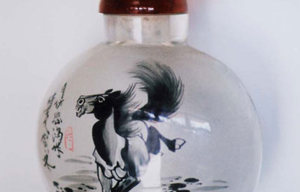Kaleidoscope
Coils almost halve risk of cervical cancer-study
Updated: 2011-09-13 09:11
(Agencies)
* Large analysis finds coils can protect against cervical cancer
* Surprising results should reassure women, doctors
* Vaccines on market against HPV that causes cervical cancer
LONDON - Contrary to popular belief, coil contraceptive devices might actually protect women against developing cervical cancer even though they don't stop the infection that commonly leads to the disease, according to the results of an international study.
While coils are unlikely to be recommended as way of preventing cervical cancer -- the second most common form of cancer in women worldwide -- the research should reassure women and their doctors that using them carries no added risk of the disease.
Spanish researchers who studied 20,000 women found that those with a history of using coils, or intrauterine devices (IUDs), were no less likely than women who don't to contract the human papillomavirus (HPV) that causes cervical cancer, but they had only around half the risk of developing the cancer itself.
The scientists think possible explanations for the protective effect of coils could be that the process of inserting or removing them destroys pre-cancerous cells, or that it causes some kind of inflammation that prompts a long-lasting immune response and prevents the HPV from progressing.
"It was a little unexpected," Xavier Castellsague of the cancer epidemiological research programme at the Llobregat Hospital in Catalonia said in a telephone interview. "The data (available) before we did this study were very inconsistent, so we didn't expect to find such a strong association with this protective effect."
Cancer of the cervix is the second most common cancer in women across the world, with about 500,000 new cases and 250,000 deaths each year, according to the World Health Organisation.
Virtually all cervical cancer cases are linked to genital infection with HPV, which is the most common viral infection of the reproductive tract.
Drugmakers Merck and GlaxoSmithKline have vaccines that protect against HPV and many wealthy and some developing countries have started nationwide immunisation programmes for girls to prevent more cases of cervical cancer.
A coil is a plastic and copper or hormone-containing contraceptive device that is placed in the uterus to prevent sperm from joining with an egg.
Previous studies have shown that using coils can protect women against another type of cancer called endometrial cancer, but until now it was not clear whether they could also have an affect on the risk of cervical cancer.
Castellsague's team, whose study was published in the Lancet Oncology journal on Tuesday, analysed data from 10 case-control studies of cervical cancer done in eight countries and 16 HPV prevalence surveys in women from four continents. The findings were adjusted for the number of sexual partners and other confounding factors.
The results show that coil use did not affect the risk of HPV infection, but was linked to a markedly lower risk of cervix cancer for both major types of the disease -- reducing the likelihood of developing squamous-cell carcinoma by 44 percent and adenocarcinoma or adenosquamous carcinoma by 54 percent.
The length of time that women used a coil did not significantly alter the risk, the researchers said. They found the risk was reduced by nearly half in the first year of use and the protective effect remained significant even after 10 years.
"IUDs are not inert devices," Castellsague said. "Our speculation is that they act as a foreign body and stimulate inflammatory changes that prevent the HPV infection from persisting and progressing to more advanced stages."
(Reporting by Kate Kelland)
E-paper

The snuff of dreams
Chinese collectors have discovered the value of beautiful bottles
Perils in relying on building boom
Fast forward to digital age
Bonds that tie China. UK
Specials

Let them eat cake
Cambridge University graduate develops thriving business selling cupcakes

A case is laid to rest
In 1937, a young woman'S body was found in beijing. paul french went searching for her killer

Banking on change
Leading economist says china must transform its growth model soon
